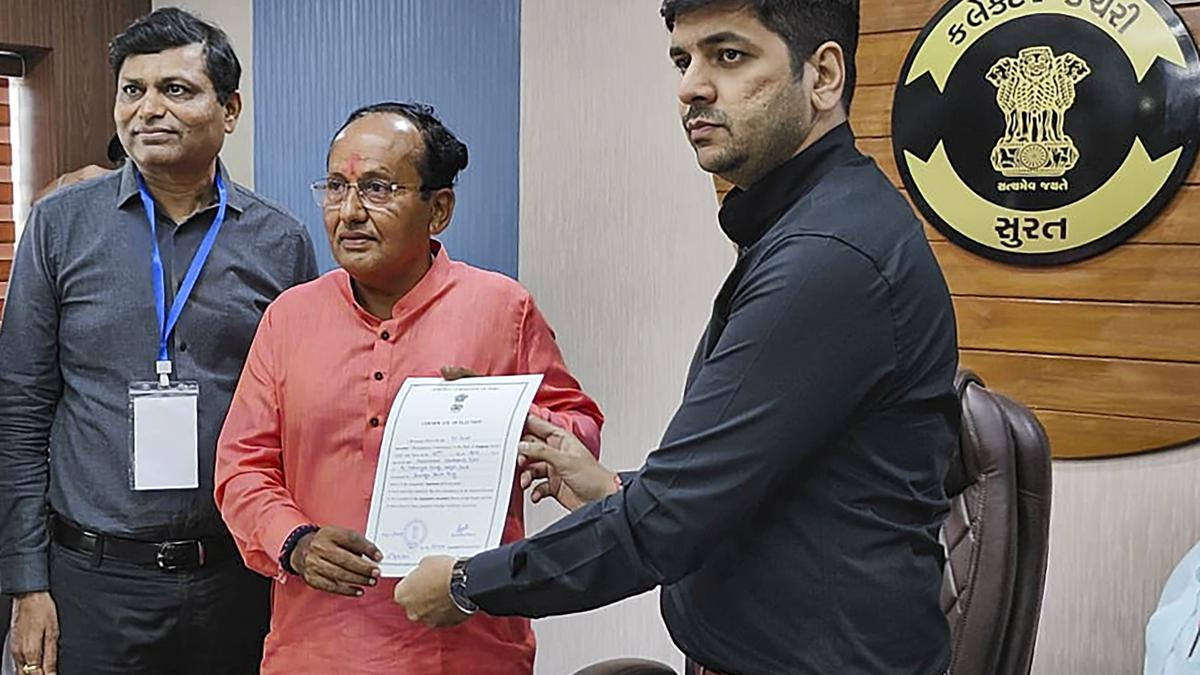
Copyright infringement not intended
Picture Courtesy: https://www.thehindu.com/elections/when-is-a-candidate-elected-unopposed-explained/article68114099.ece
Context: Recently a candidate was elected unopposed in the Surat Lok Sabha constituency after the rejection of opposition candidates' nominations and the withdrawal of other nominees, resulting in the cancellation of elections in the city on May 7.
Election of Candidate Unopposed
Procedure for Uncontested Elections
- As per Section 53(3) of the Representation of the People Act, 1951, if the number of candidates remaining after the withdrawal of nominations is less than the number of seats to be filled, the returning officer (RO) declares the remaining candidate(s) elected without the need for polling.
- The provision allows for a candidate to be declared elected unopposed when no other candidates remain in the race for a particular seat.
Surat Lok Sabha Constituency Case
- A candidate was elected unopposed in the Surat Lok Sabha constituency after the rejection of the nomination papers of opposition candidates and the withdrawal of other nominees.
- The rejection of nomination papers and subsequent withdrawals led to the candidate being the sole remaining candidate, making him eligible for an uncontested election and thereby declared elected without the need for polling.
|
Historical Context of Unopposed Victories
●Since 1951, a total of 35 candidates have won Lok Sabha elections without facing any contest, entering Parliament directly due to a lack of opposing candidates.
●The frequency of unopposed wins varied across different general election years, with peaks observed in certain election cycles. For example, a maximum of seven candidates won uncontested in the 1957 general elections, demonstrating instances where opposition parties did not field candidates against certain contenders.
|
NOTA (None of the Above) and Election System
Introduction of NOTA
- The NOTA option was introduced in 2013 following a Supreme Court verdict that allowed voters to exercise their right to reject all candidates standing in an election.
- NOTA give voters the option to express dissatisfaction with available candidates, promoting accountability and transparency in the electoral process.
Distinguishing Rule 49-O and NOTA
- Rule 49-O, an earlier provision, required voters to inform polling officers of their decision not to vote, potentially compromising secrecy. NOTA allow voters to express disapproval without revealing their choice to others.
- The use of NOTA ensures secrecy while giving voters a meaningful way to express dissatisfaction with candidates.

Supreme Court's Stance on NOTA
- The Supreme Court has upheld the use of NOTA as an essential democratic tool, promoting electoral reforms and accountability among political parties.
- However, NOTA votes are not considered in determining the winner of an election. The candidate with the highest valid votes is still declared the winner, regardless of the number of NOTA votes cast.
Implications and Controversies
- Despite the use of NOTA by voters, it has been criticized for lacking significant implications on election outcomes. Candidates receiving fewer votes than NOTA are not barred from contesting in future elections, leading to calls for stronger electoral reforms.
Recent Supreme Court Petition and Response
- Petition filed in the Supreme Court to direct the Election Commission (EC) to conduct fresh elections in constituencies where NOTA votes exceed those for any candidate.
- The petition seeks to debar candidates receiving fewer votes than NOTA from contesting elections for a specified period, aiming to promote accountability and discourage non-serious candidates.
|
Response from the Election Commission
The Supreme Court has asked the EC to respond to the petition, addressing concerns about the impact of NOTA on election results and potential reforms to enhance the electoral process.
|
Conclusion
- The election process plays a crucial role in promoting transparency, accountability, and democratic values in India's electoral system. The recent developments and legal proceedings reflect ongoing efforts to strengthen electoral reforms and address concerns related to candidate selection and voter choice in elections. The Supreme Court's involvement highlights the significance of ensuring fair and credible elections through continuous review and adaptation of electoral laws and procedures.
Must Read Articles:
NOTA
Source:
The Hindu
NDTV
|
PRACTICE QUESTION
Q. What are the legal provisions and challenges involved in dealing with the issue of criminal candidates contesting elections in India? Discuss the role of the Election Commission and the judiciary in addressing this problem.
|




